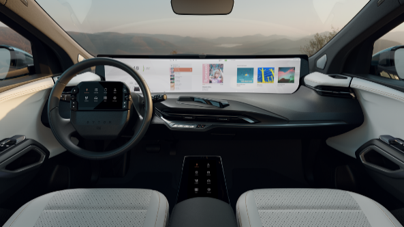Even though the products showcased there are not exactly in the Critical Link wheelhouse, I’m always interested in seeing what’s up at CES, the big consumer electronics show that’s held each January in Las Vegas. And so I avidly read up on the robot that delivers toilet paper (Charmin, to be exact); the Alexa-driven shower head; the smart cat litter box; the TV that goes from horizontal to vertical…
As always, what most captivates me as a car-loving techie, is the automotive technology that’s on display. CNET did a nice round-up of what’s new and cool, saving me a trip to Las Vegas.
Many people associate Bosch with upscale kitchen appliances, but they have a major automotive business. They’re introducing the Bosch Virtual Visor, which they’re hoping will replace the sometimes awkward and unwieldy sun visor we’re all familiar with.
Bosch ‘s Virtual Visor uses transparent LCD screen and an in-car RGB camera which can track the sun shining on the driver’s face. The system then darkens sections of the Virtual Visor to prevent glares, with some 90% of the visor staying transparent at all times, for better visibility. (Source: CNET)
Getting rid of glare without compromising on visibility? What a great idea! Sign me up for this one.
It’s probably a matter of time before all cars and trucks implement Amazon Alexa Integration in ways that go beyond the basics. For a couple of high-end vehicles, Alexa tech is now being used to handle more and more vehicle functions. The companies that are going the furthest include Lamborghini (vroom-vroom) and Rivian (electric cars and trucks). For now, Lamborghini is focusing its Alexa efforts on the Huracan Evo, where Alexa can do things like open and close the trunk. (I did say high-end, didn’t I? This goes from more than $250K.) Lamborghini will be integrating Alexa into its hybrid models, and Alexa will be able to control the switch between driving modes. I’d like to say ‘sign me up for this one,’ but not at that price point! Still, the idea of tight integration between Alexa and actual vehicle control is inevitable.
The BMW ZeroG Lounger seat, which is not yet in production, will be able to recline “either 40 or 60 degrees”, and the “seatbelt moves along with the passenger.” I like the idea that the seatbelt moves, and I hope they keep the recline to 60 degrees. Wouldn’t want to see drivers trying to drive while reclining at, say, 180 degrees. We should wait for fully autonomous driving before we allow that. Other Lounger goodies: a wrap-around “cocoon-style” airbag, and “when the seat is reclined, a screen drops down from the headliner and can show directional information, which combined with the position of the seat, can prevent motion sickness.” Now if they can come up with something that can prevent motion sickness among kids riding in the back seat, they’ll make a lot of parents very happy.
Another emerging automotive technology is the Continental and Sennheiser speakerless audio system. Surround-sounds will be coming at you through the dash, door panels, the car’s headliner. Bonus because being able to go speakerless will cut down on a vehicle’s weight. Anyway, the system is still in the somewhat conceptual stages, but sounds like good, good, good vibrations to me.
Lastly, CNET listed Byton in-car entertainment partnerships. The Byton M-Byte is an all-electric SUV which was introduced last year at the Frankfurt Motor Show, and which was shown off to US prospects for the first time at CES 2020. (The company is Chinese.) Byton’s going all-in on entertainment, and ViacomCBS and Accuweather are among the providers that will be making content available on the M-Byte’s 48-inch screen. (Yes, you read that right: 48-inch!) As the article’s writer says, “let’s just hope Byton also puts the necessary precautions in place to ma ke sure that people aren’t trying to watch their favorite TV show while out on the open road.” Couldn’t have said it better myself. As far as I’m concerned, having a full-blown entertainment center in your car can wait until we have fully-blown self-driving vehicles.
ke sure that people aren’t trying to watch their favorite TV show while out on the open road.” Couldn’t have said it better myself. As far as I’m concerned, having a full-blown entertainment center in your car can wait until we have fully-blown self-driving vehicles.
That’s it for car tech at CES 2020. Vroom, vroom…
